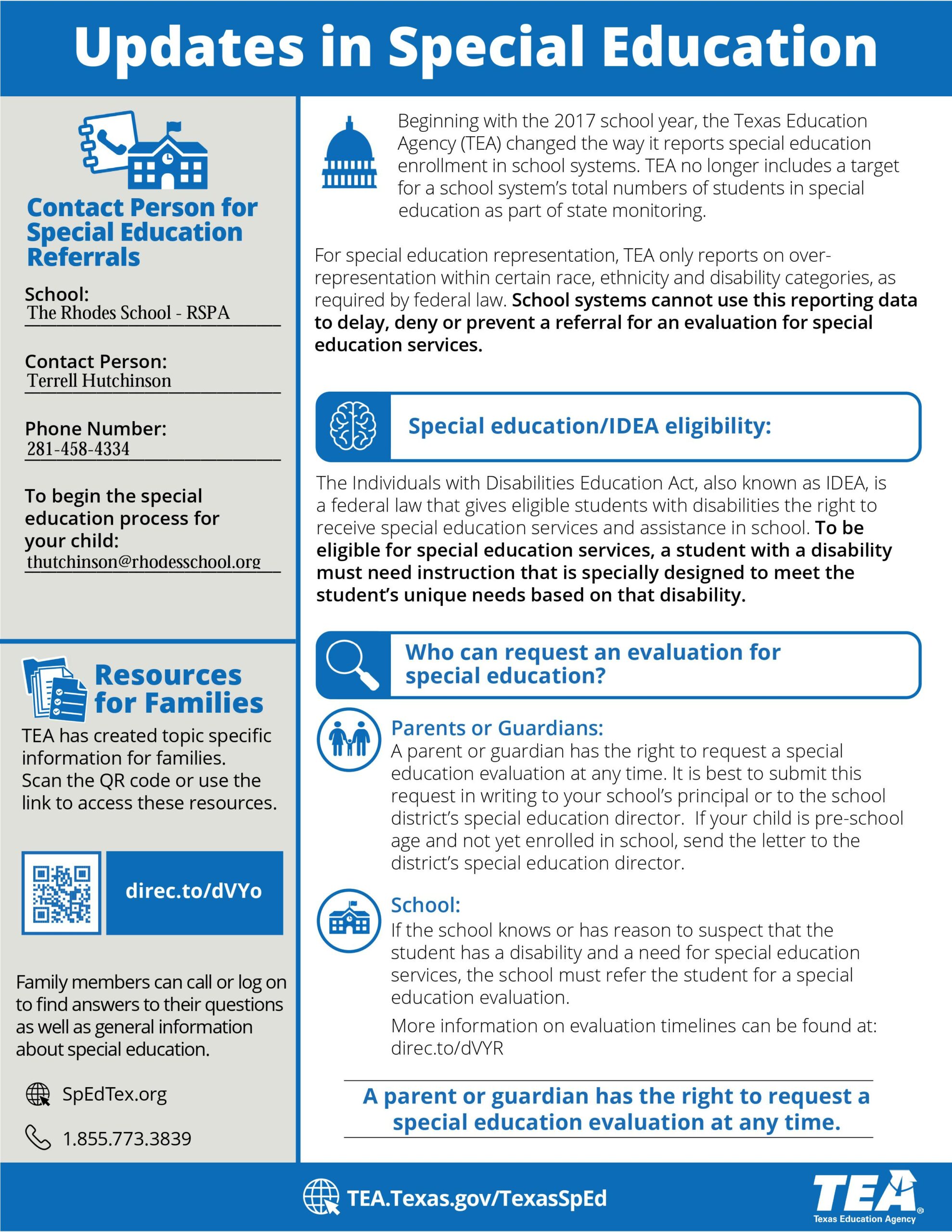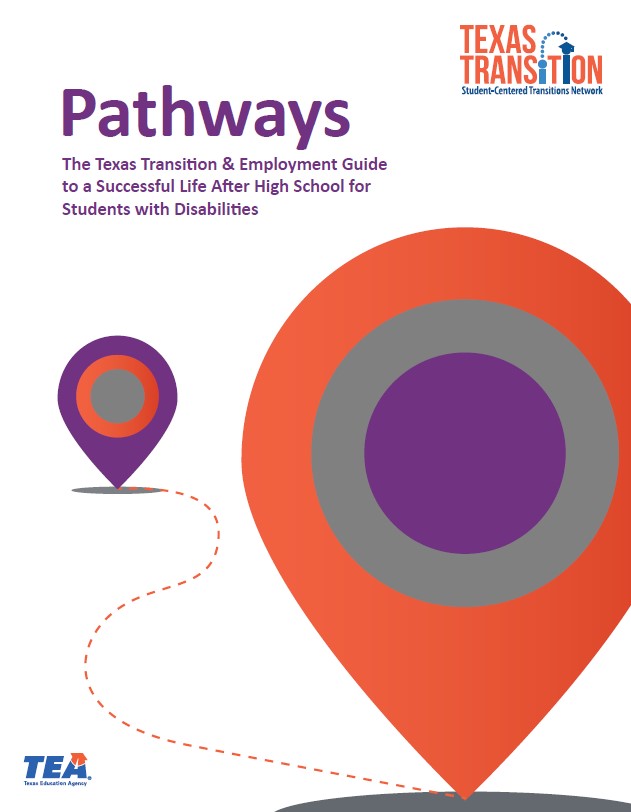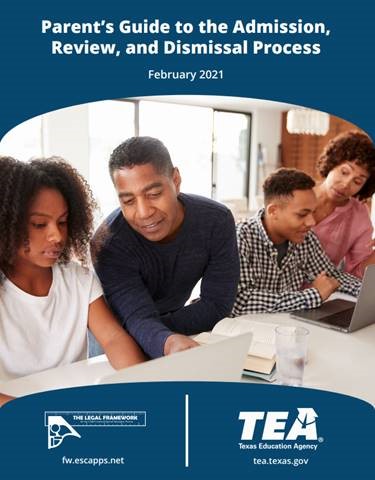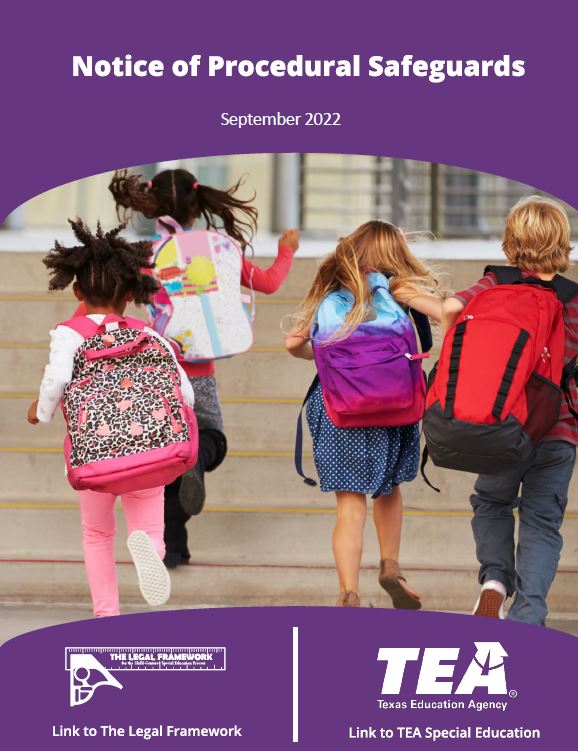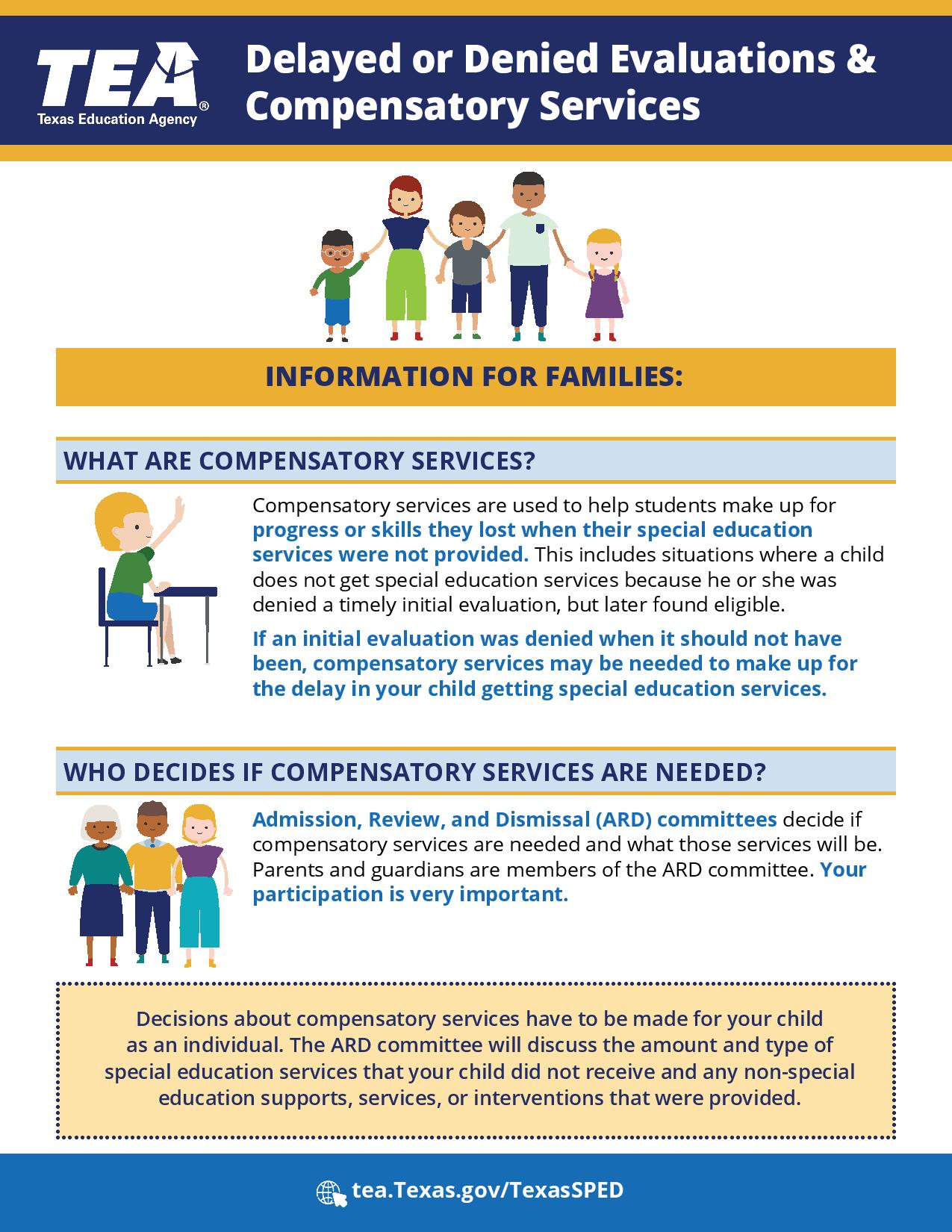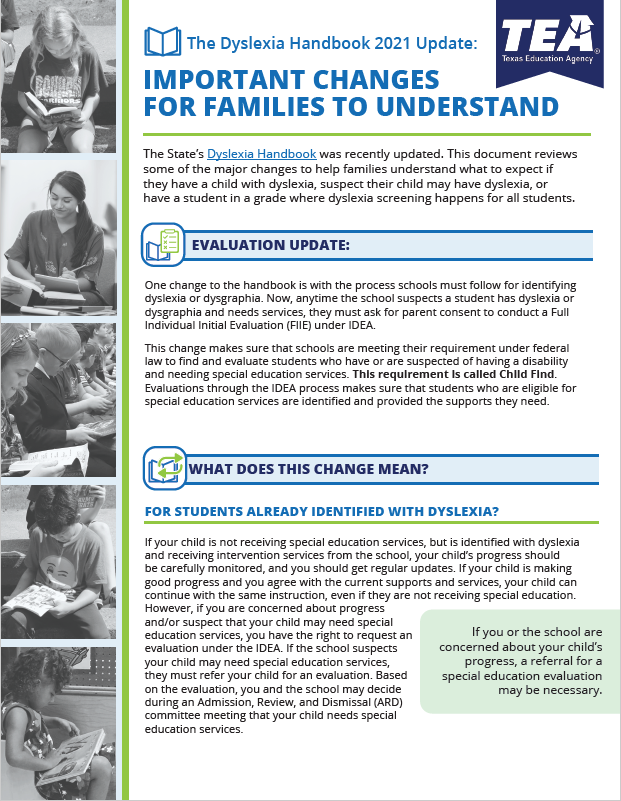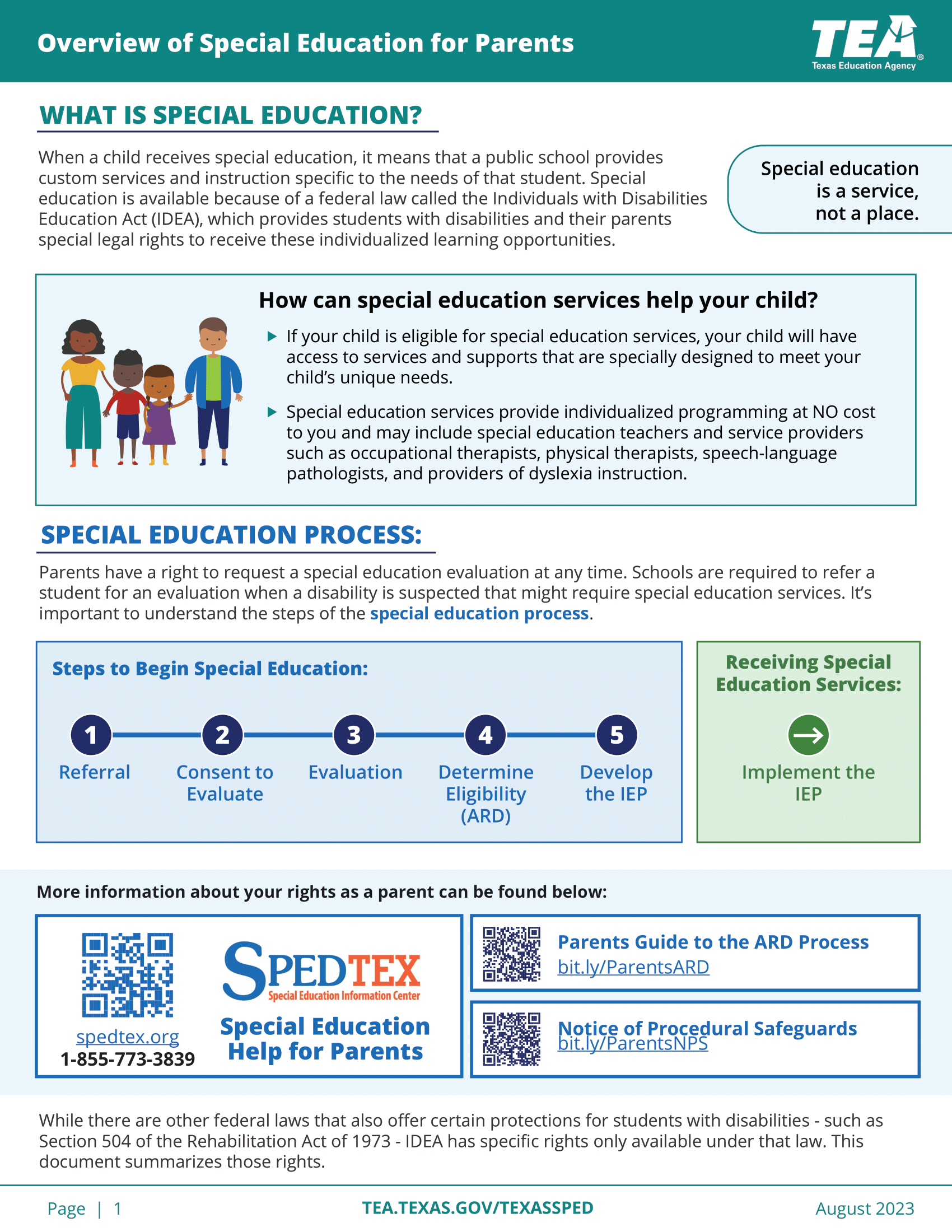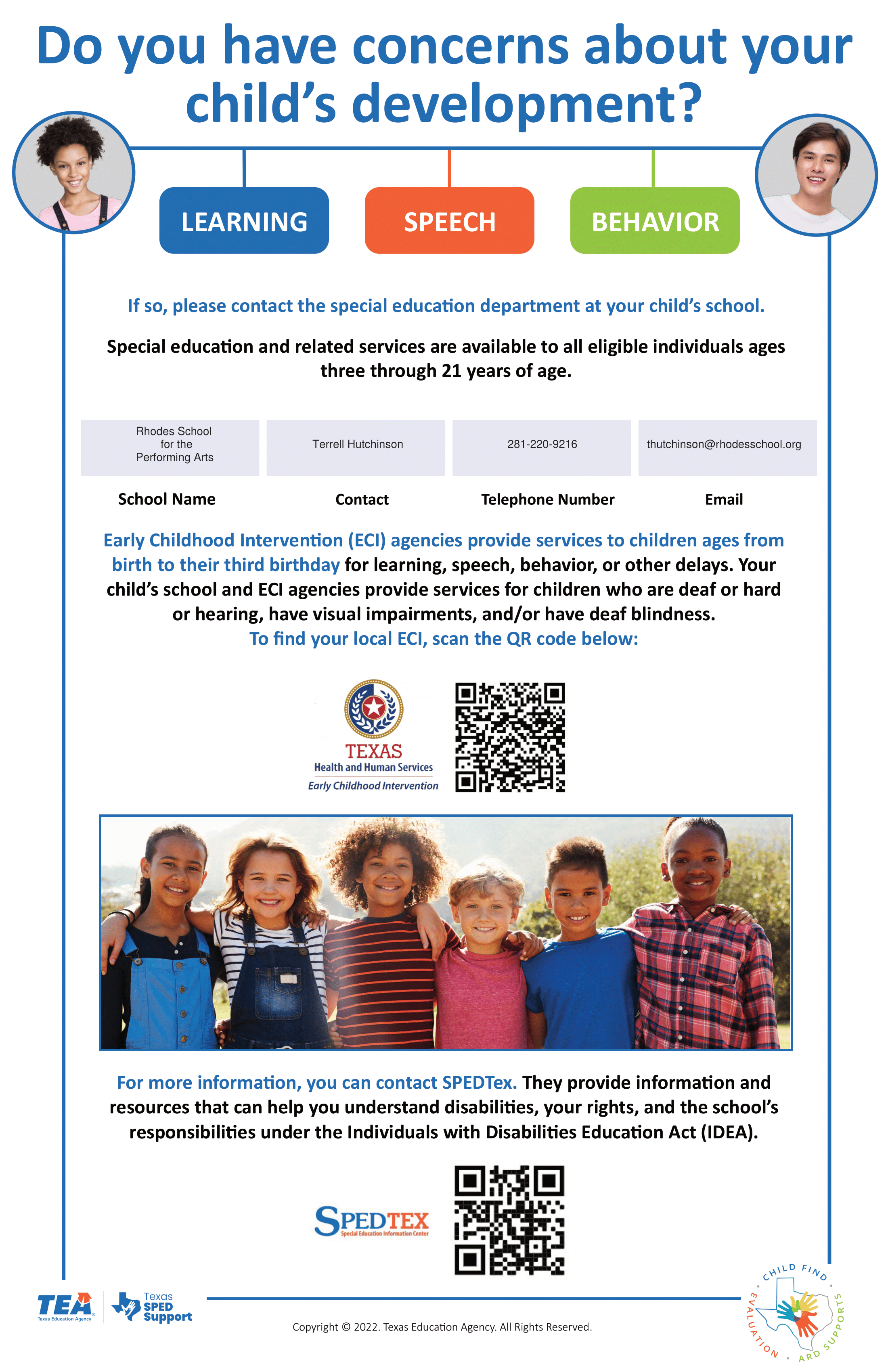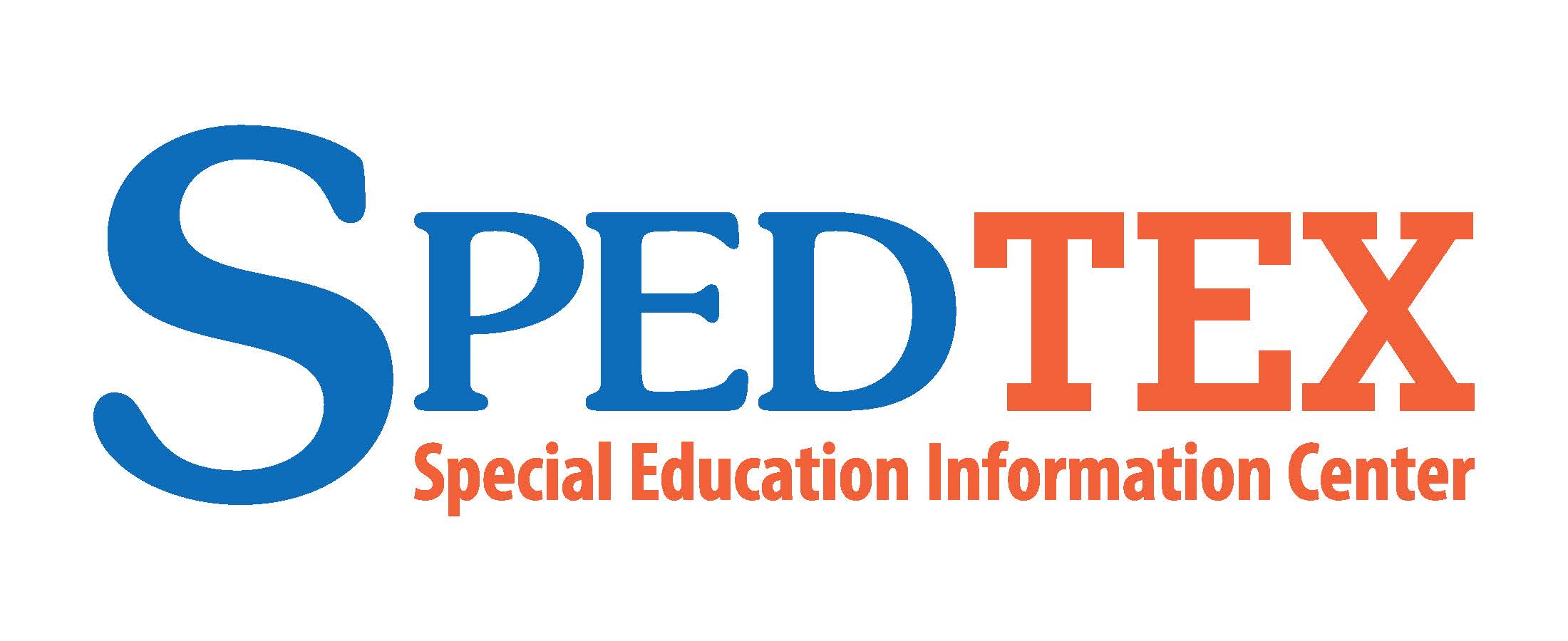Rhodes School for the performing arts
Special education
The Rhodes School for the Performing Arts Special Education Departments seeks to ensure that ALL students on every campus, in every classroom, every day, engage in rigorous, aligned, and active learning. We will embrace the abilities of all students, empowering them to succeed and lead as productive citizens. To begin the special education process for your child, speak with your child’s teacher.
Updates in special education
Beginning with the 2017 school year, the Texas Education Agency (TEA) changed the way it reports special education enrollment in school systems. TEA no longer includes a target Contact Person for a school system’s total numbers of students in special education as part of state monitoring. For special education representation, TEA only reports on over-representation within certain races, ethnicity, and disability categories, as required by federal law. School systems cannot use this reporting data to delay, deny or prevent a referral for an evaluation for special education services.
Special Education/IDEA Eligibility
The Individuals with Disabilities Education Act, also known as IDEA, is a federal law that gives eligible students with disabilities the right to receive special education services and assistance in school. To be eligible for special education services, a student with a disability must need instruction that is specially designed to meet the student’s unique needs based on that disability.
Who can request an evaluation for special eduation
Parents or Guardians:
A parent or guardian has the right to request a special education evaluation at any time. It is best to submit this request in writing to your school’s principal or to the school district’s special education director. If your child is pre-school age and not yet enrolled in school, send the letter to the district’s special education director.
School:
If the school knows or has reason to suspect that the student has a disability and a need for special education services, the school must refer the student for a special education evaluation. More information on evaluation timelines can be found at: direc.to/dvYR
Resources
Child Find
RSPA is responsible for identifying and evaluating students who, within the intent of Section 504 of the Rehabilitation Act of 1973, need special services or programs in order that such students may receive the required free appropriate education.
SPEDTex
The Special Education Information Center (SPEDTex) provides resources and interactive features for increasing family awareness of disabilities and special education processes, with the goal of improving partnerships between schools and families.
Contact Information:
Phone: 1-855-773-3839
Email: inquire@spedtex.org
Live Chat: www.spedtex.org
A student who may need specialized instruction or programs within the intent of Section 504 is one who:
- Has a physical or mental impairment that substantially limits one or more of life’s major activities; or
- Has a record of such impairment; or
- Is regarded as having such impairment.
Students may be eligible under the provisions of Section 504 even though they do not require services pursuant to the Individuals with Disabilities Education Act. Parents who believe that they have a child who may qualify for special services or programs under Section 504 should contact the Campus 504 Coordinator In addition, parents who believe that they have a child who may qualify for special education services or programs under the Individuals with Disabilities Education Improvement Act (IDEA) should contact the home campus office for more information.
Education Services Must Meet Individual Needs
To be appropriate, education programs for students with disabilities must be designed to meet their individual needs to the same extent that the needs of nondisabled students are met. An appropriate education may include regular or special education and related aids and services to accommodate the unique needs of individuals with disabilities.
One way to ensure that programs meet individual needs is through the development of an individualized education program (IEP) for each student with a disability. IEPs are required for students participating in the special education programs of recipients of funding under the IDEA.
The quality of education services provided to students with disabilities must equal the quality of services provided to nondisabled students. Teachers of students with disabilities must be trained in the instruction of individuals with disabilities. Facilities must be comparable, and appropriate materials and equipment must be available.
Students with disabilities may not be excluded from participating in nonacademic services and extracurricular activities on the basis of disability. Persons with disabilities must be provided an opportunity to participate in nonacademic services that is equal to that provided to persons without disabilities. These services may include physical education and recreational athletics, transportation, health services, recreational activities, special interest groups or clubs sponsored by the school, and referrals to agencies that provide assistance to persons with disabilities and employment of students.
Education Services Must Meet Individual Needs
To be appropriate, education programs for students with disabilities must be designed to meet their individual needs to the same extent that the needs of nondisabled students are met. An appropriate education may include regular or special education and related aids and services to accommodate the unique needs of individuals with disabilities.
One way to ensure that programs meet individual needs is through the development of an individualized education program (IEP) for each student with a disability. IEPs are required for students participating in the special education programs of recipients of funding under the IDEA.
The quality of education services provided to students with disabilities must equal the quality of services provided to nondisabled students. Teachers of students with disabilities must be trained in the instruction of individuals with disabilities. Facilities must be comparable, and appropriate materials and equipment must be available.
Students with disabilities may not be excluded from participating in nonacademic services and extracurricular activities on the basis of disability. Persons with disabilities must be provided an opportunity to participate in nonacademic services that is equal to that provided to persons without disabilities. These services may include physical education and recreational athletics, transportation, health services, recreational activities, special interest groups or clubs sponsored by the school, and referrals to agencies that provide assistance to persons with disabilities and employment of students.
Students With Disabilities Must Be Educated With Nondisabled Students
Students with disabilities and students without disabilities must be placed in the same setting, to the maximum extent appropriate to the education needs of the students with disabilities. A recipient of ED funds must place a person with a disability in the regular education environment unless it is demonstrated by the recipient that the student’s needs cannot be met satisfactorily with the use of supplementary aids and services. Students with disabilities must participate with nondisabled students in both academic and nonacademic services, including meals, recess, and physical education, to the maximum extent appropriate to their individual needs.
As necessary, specific related aids and services must be provided for students with disabilities to ensure an appropriate education setting. Supplementary aids may include interpreters for students who are deaf, readers for students who are blind, and door-to-door transportation for students with mobility impairments.
A recipient of ED funds that places an individual with disabilities in another school is responsible for taking into account the proximity of the other school to the student’s home. If a recipient operates a facility for persons with disabilities, the facility and associated activities must be comparable to other facilities, services, and activities of the recipient.
Evaluation and Placement Decisions Must Be Made in Accord With Appropriate Procedures
Failure to provide persons with disabilities with an appropriate education frequently occurs as a result of misclassification and inappropriate placement. It is illegal to base individual placement decisions on presumptions and stereotypes regarding persons with disabilities or on classes of such persons. For example, it would be a violation of the law for a recipient to adopt a policy that every student who is hearing impaired, regardless of the severity of the child’s disability, must be placed in a state school for the deaf.
Section 504 requires the use of evaluation and placement procedures that ensure that children are not misclassified, unnecessarily labeled as having a disability, or incorrectly placed, based on inappropriate selection, administration, or interpretation of evaluation materials.
A school district must conduct or arrange for an individual evaluation at no cost to the parents before any action is taken with respect to the initial placement of a child who has a disability, or before any significant change in that placement. Recipients of ED funds must establish standards and procedures for initial and continuing evaluations and placement decisions regarding persons who, because of a disability, need or are believed to need special education or related services.
As necessary, specific related aids and services must be provided for students with disabilities to ensure an appropriate education setting. Supplementary aids may include interpreters for students who are deaf, readers for students who are blind, and door-to-door transportation for students with mobility impairments.
A recipient of ED funds that places an individual with disabilities in another school is responsible for taking into account the proximity of the other school to the student’s home. If a recipient operates a facility for persons with disabilities, the facility and associated activities must be comparable to other facilities, services, and activities of the recipient.
These procedures must ensure that tests and other evaluation materials:
have been validated for the specific purpose for which they are used, and are administered by trained personnel in conformance with the instructions provided by their producer; are tailored to assess specific areas of education need and are not designed merely to provide a single general intelligence quotient; and are selected and administered so as best to ensure that, when a test is administered to a student with impaired sensory, manual, or speaking skills, the test results accurately reflect the student’s aptitude or achievement level or whatever other factor the test purports to measure, rather than reflecting the student’s impaired sensory, manual, or speaking skills (except where those skills are the factors that the test purports to measure).
Recipients must draw upon a variety of sources in the evaluation and placement process so that the possibility of error is minimized. All significant factors related to the learning process must be considered.
These sources and factors include, for example, aptitude and achievement tests, teacher recommendations, physical condition, social and cultural background, and adaptive behavior. “Adaptive behavior is the effectiveness with which the individual meets the standards of personal independence and social responsibility expected of his or her age and cultural group.” (See Appendix A to 34 CFR Part 104, Evaluation and Placement.)
Information from all sources must be documented and considered by a group of knowledgeable persons, and procedures must ensure that the student is placed with nondisabled students to the greatest extent appropriate.
Periodic reevaluation is required. This may be conducted in accordance with the IDEA regulation, which requires reevaluation at three-year intervals (unless the parent and school district agree reevaluation is unnecessary) or more frequently if conditions warrant, or if the child’s parent or teacher requests a reevaluation.
Recipients Must Have Due Process Procedures for the Review of Identification, Evaluation, and Placement Decisions
Public elementary and secondary schools must employ procedural safeguards regarding the identification, evaluation, or educational placement of persons who, because of disability, need or are believed to need special instruction or related services.
Parents must be told about these procedures. In addition, parents or guardians must be notified of any evaluation or placement actions, and must be allowed to examine the student’s records. The due process procedures must allow the parents or guardians of students in elementary and secondary schools to challenge evaluation and placement procedures and decisions.
If parents or guardians disagree with the school’s decisions, they must be afforded an impartial hearing, with an opportunity for their participation and for representation by counsel. A review procedure also must be available to parents or guardians who disagree with the hearing decision.
How Is A Free Education Defined?
Recipients operating federally funded programs must provide education and related services free of charge to students with disabilities and their parents or guardians. Provision of a free education is the provision of education and related services without cost to the person with a disability or his or her parents or guardians, except for fees equally imposed on nondisabled persons or their parents or guardians.
If a recipient is unable to provide a free appropriate public education itself, the recipient may place a person with a disability in, or refer such person to, a program other than the one it operates. However, the recipient remains responsible for ensuring that the education offered is an appropriate education, as defined in the law, and for coverage of financial obligations associated with the placement.
The cost of the program may include tuition and other related services, such as room and board, psychological and medical services necessary for diagnostic and evaluative purposes, and adequate transportation. Funds available from any public or private source, including insurers,4 may be used by the recipient to meet the requirements of FAPE.
If a student is placed in a private school because a school district cannot provide an appropriate program, the financial obligations for this placement are the responsibility of the school district. However, if a school district makes available a free appropriate public education and the student’s parents or guardian choose to place the child in a private school, the school district is not required to pay for the student’s education in the private school. If a recipient school district places a student with a disability in a program that requires the student to be away from home, the recipient is responsible for the cost of room and board and nonmedical care.
To meet the requirements of FAPE, a recipient may place a student with a disability in, or refer such student to, a program not operated by the recipient. When this occurs, the recipient must ensure that adequate transportation is provided to and from the program at no greater personal or family cost than would be incurred if the student with a disability were placed in the recipient’s program.
FAPE Provisions in the Individuals with Disabilities Education Act (IDEA)
Part B of IDEA requires participating states5 to ensure that a free appropriate public education (FAPE) is made available to eligible children with disabilities in mandatory age ranges residing in the state. To be eligible, a child must be evaluated as having one or more of the disabilities listed in IDEA and determined to be in need of special education and related services. Evaluations must be conducted according to prescribed procedures. The disabilities specified in IDEA include: mental retardation, hearing impairments including deafness, speech or language impairments, visual impairments including blindness, emotional disturbance, orthopedic impairments, autism, traumatic brain injury, other health impairments, specific learning disabilities, deaf-blindness, and multiple disabilities. Additionally, states and local education agencies (LEAs) may adopt the term “developmental delay” for children aged 3 through 9 (or a subset of that age range) who are experiencing a developmental delay as defined by the state and need special education and related services.
The requirements for FAPE under IDEA are more detailed than those under Section 504. In specific instances detailed in the Section 504 regulation (for example, with respect to reevaluation procedures and the provision of an appropriate education), meeting the requirements of IDEA is one means of meeting the requirements of the Section 504 regulation.
IDEA requirements apply to states receiving financial assistance under IDEA. States must ensure that their political subdivisions that are responsible for providing or paying for the education of children with disabilities meet IDEA requirements. All states receive IDEA funds. Section 504 applies to any program or activity receiving ED financial assistance.
IDEA is administered by ED’s Office of Special Education Programs (OSEP), a component of ED’s Office of Special Education and Rehabilitative Services (OSERS). For more information about IDEA, contact OSERS at 400 Maryland Ave. S.W., Washington, DC 20202-7100. Additional information is also available at: http://www. ed.gov/about/offices/list/osers/osep/.
How to Obtain Further Assistance And Information
If you would like more information about Section 504 and the other laws enforced by the Office for Civil Rights, about how to file a complaint, or, if you are a school or school district, about how to obtain technical assistance, contact the Enforcement Office that serves your state or jurisdiction.
Contact information for these offices is at http://wdcrobcolp01.ed.gov/CFAPPS/OCR/contactus.cfm.
Information about discrimination based on disability is on OCR’s Web site at http://www.ed.gov/policy/rights/guid/ocr/disability.html.
For further information, please contact our Customer Service Team toll-free at 1-800-421-3481.
Aiding Students Who Have Learning Difficulties or Who Need Special Education or Section 504 Services
For those students who are having difficulty in the regular classroom, all school districts and open-enrollment charter schools must consider tutorial, compensatory, and other academic or behavior support services that are available to all students, including a process based on Response to Intervention (RtI). The implementation of RtI has the potential to have a positive impact on the ability of districts and charter schools to meet the needs of all struggling students.
If a student is experiencing learning difficulties, his or her parent may contact the individual(s) listed below to learn about the school’s overall general education referral or screening system for support services. This system links students to a variety of support options, including making a referral for a special education evaluation or for a Section 504 evaluation to determine if the student needs specific aids, accommodations, or services. A parent may request an evaluation for special education or Section 504 services at any time.
Special Education Referrals
If a parent makes a written request for an initial evaluation for special education services to the director of special education services or an administrative employee of the school district or open-enrollment charter school, the district or charter school must respond no later than 15 school days after receiving the request. At that time, the district or charter school must give the parent a prior written notice of whether it agrees to or refuses to evaluate the student, along with a copy of the Notice of Procedural Safeguards. If the school district or charter school agrees to evaluate the student, it must also give the parent the opportunity to give written consent for the evaluation.
Please note that a request for a special education evaluation may be made verbally and does not need to be in writing. Districts and charter schools must still comply with all federal prior written notice and procedural safeguard requirements and the requirements for identifying, locating, and evaluating children who are suspected of being a child with a disability and in need of special education. However, a verbal request does not require the district or charter school to respond within the 15-school-day timeline.
If the district or charter school decides to evaluate the student, it must complete the student’s initial evaluation and evaluation report no later than 45 school days from the day it receives a parent’s written consent to evaluate the student. However, if the student is absent from school during the evaluation period for three or more school days, the evaluation period will be extended by the number of school days equal to the number of school days that the student is absent.
There is an exception to the 45-school-day timeline. If a district or charter school receives a parent’s consent for the initial evaluation at least 35 but less than 45 school days before the last instructional day of the school year, it must complete the written report and provide a copy of the report to the parent by June 30 of that year. However, if the student is absent from school for three or more days during the evaluation period, the June 30th due date no longer applies. Instead, the general timeline of 45 school days plus extensions for absences of three or more days will apply. Upon completing the evaluation, the district or charter school must give the parent a copy of the evaluation report at no cost. Additional information regarding special education is available from the district or charter school in a companion document titled Parent’s Guide to the Admission, Review, and Dismissal Process.
Special Education Referrals:
If the district or charter school decides to evaluate the student, it must complete the student’s initial evaluation and evaluation report no later than 45 school days from the day it receives a parent’s written consent to evaluate the student. However, if the student is absent from school during the evaluation period for three or more school days, the evaluation period will be extended by the number of school days equal to the number of school days that the student is absent.
There is an exception to the 45-school-day timeline. If a district or charter school receives a parent’s consent for the initial evaluation at least 35 but less than 45 school days before the last instructional day of the school year, it must complete the written report and provide a copy of the report to the parent by June 30 of that year. However, if the student is absent from school for three or more days during the evaluation period, the June 30th due date no longer applies. Instead, the general timeline of 45 school days plus extensions for absences of three or more days will apply. Upon completing the evaluation, the district or charter school must give the parent a copy of the evaluation report at no cost. Additional information regarding special education is available from the district or charter school in a companion document titled Parent’s Guide to the Admission, Review, and Dismissal Process.
Contact Person for Special Education Referrals:
The designated person to contact regarding options for a student experiencing learning difficulties or regarding a referral for evaluation for special education services is:
Terrell Hutchinson-Smith
Phone Number: (346) 326-7663
Section 504 Referrals
Each school district or charter school must have standards and procedures in place for the evaluation and placement of students in the district’s or charter school’s Section 504 program. Districts and charter schools must also implement a system of procedural safeguards that includes notice, an opportunity for a parent or guardian to examine relevant records, an impartial hearing with an opportunity for participation by the parent or guardian and representation by counsel, and a review procedure.
Contact Person for Section 504 Referrals:
The designated person to contact regarding options for a student experiencing learning difficulties or regarding a referral for evaluation for Section 504 services is:
Terrell Hutchinson-Smith
Phone Number: (346) 326-7663
Special Education Department
Administration Building – Room 20
13334 Wallisville Road
Houston, TX 77049
281-458-4334 ext 117
346-326-7763

Terrell Hutchinson-Smith, Director of Special Education

Skyler Mitchell,
Special Populations Specialist

April Washington, SPED Instructional Specialist

Rachel Sanchez, Special Populations Interventionist

ADMINISTRATIVE BUILDING
13334 Wallisville Rd.
Houston, TX 77049
(281) 458-4334
information@rhodesschool.org
CAMPUS LOCATION
13334 Wallisville Rd.
Houston, TX 77049
(281) 459-9797
Charles Russell, M. Ed, President
Kenitra Bennett-Edwards, M. Ed., Member
Michelle Harris, M. Ed, Member
Sloane Hughlett, Member
Chrishelle Palay, Member
Derrick Sherrard, Member
CONNECT WITH RSPA!

